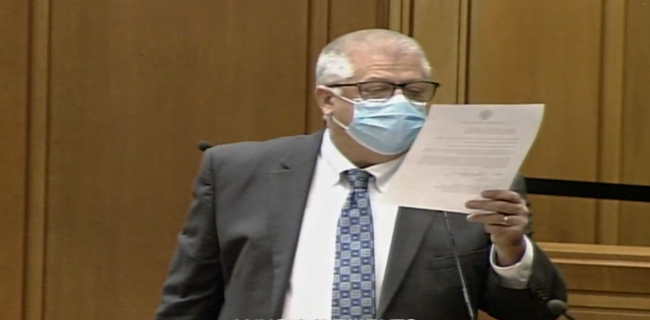 State Rep. Mike Nearman, R-Independence, reading an agreement on the House floor Monday, Jan. 1, that he will have diminished access to the Capitol after he let a group of rioters into the building. (Screen grab/Oregon Legislature)
State Rep. Mike Nearman, R-Independence, reading an agreement on the House floor Monday, Jan. 1, that he will have diminished access to the Capitol after he let a group of rioters into the building. (Screen grab/Oregon Legislature)
SALEM – State Rep. Mike Nearman, R-Independence, hasn’t heeded the House speaker’s calls to resign after he let a group of rioters into the Capitol building last month. But he will have significantly diminished influence over legislation when lawmakers meet for the 2021 session next week and he’ll have diminished access to the Capitol building.
House Speaker Tina Kotek, D-Portland, removed Nearman from all of his committee assignments. While bills need to pass the House and Senate and be signed by the governor to become law, committees are often where the bulk of the legislative work happens.
Nearman also agreed to safety measures that would require him to give 24-hour notice before he comes to the Capitol to allow staff and legislators time to adjust their schedule if they do not feel safe having him in the building.
On Monday, he read a statement on the House floor agreeing to not allow non-authorized individuals into the building and to give up his badge that gives him access to the Capitol. The Capitol building has been closed since spring as a pandemic precaution.
According to Danny Moran, Kotek’s spokesman, Nearman agreed to the safety measures in writing.
As committees draft bills, they hear from concerned citizens, advocacy groups and officials from local and state governments. Members of committees propose amendments that can substantially weaken or strengthen the provisions of legislation. Sometimes, legislation is almost entirely rewritten by committees.
The state’s two-year budget is largely written by committees. If bills don’t pass out of committees, they usually don’t have a viable route to becoming law.
First elected in 2014 to a district just west of Salem, Nearman previously served on the House’s information management and technology, education and general government committees. Despite losing his positions on these committees, he’ll still be able to introduce legislation on the floor and respond to constituent concerns. He can also offer amendments to bills that come to the House floor and vote on their passage.
On Tuesday, Nearman responded to Kotek’s call for his resignation with a sharply worded statement that offered no apology and said he was being subjected to “mob justice.”
“For the last few days, I and my family have been subjected to criticism, attacks at my home and threats via email, social media and phone,” said Nearman. “Many of these messages have been hate-filled and profanity laced.”
House Republican Leader Christine Drazan issued a statement on Sunday that didn’t call for Nearman’s resignation. Instead, she said the criminal investigation into Nearman’s conduct should be completed and he should be given due process.
Drazan also acknowledged that a surveillance video released last week showed Nearman allowing demonstrators into the Capitol who violently clashed with police.
“The melee with police which follows is difficult to watch without a profound sense of gratitude to the troopers who were able to prevent further violence that could have recklessly put more people in harm’s way,” she said. “The impacts to the Capitol community that this elevated risk for violence caused are significant.”
Moran pointed to inaccurate claims in Nearman’s statement that Kotek timed the release of the video for political purposes.
Last week, multiple media outlets reported on a surveillance video of Nearman entering the building. Moran pointed out that the speaker’s office was not in possession of the video, which was instead released by the Legislature’s administration in response to public records requests.
SUPPORT OUR VITAL LOCAL WORK: We provide Malheur County the local journalism that searches out the facts for you. SUBSCRIBE FOR $5/month. Click HERE.




